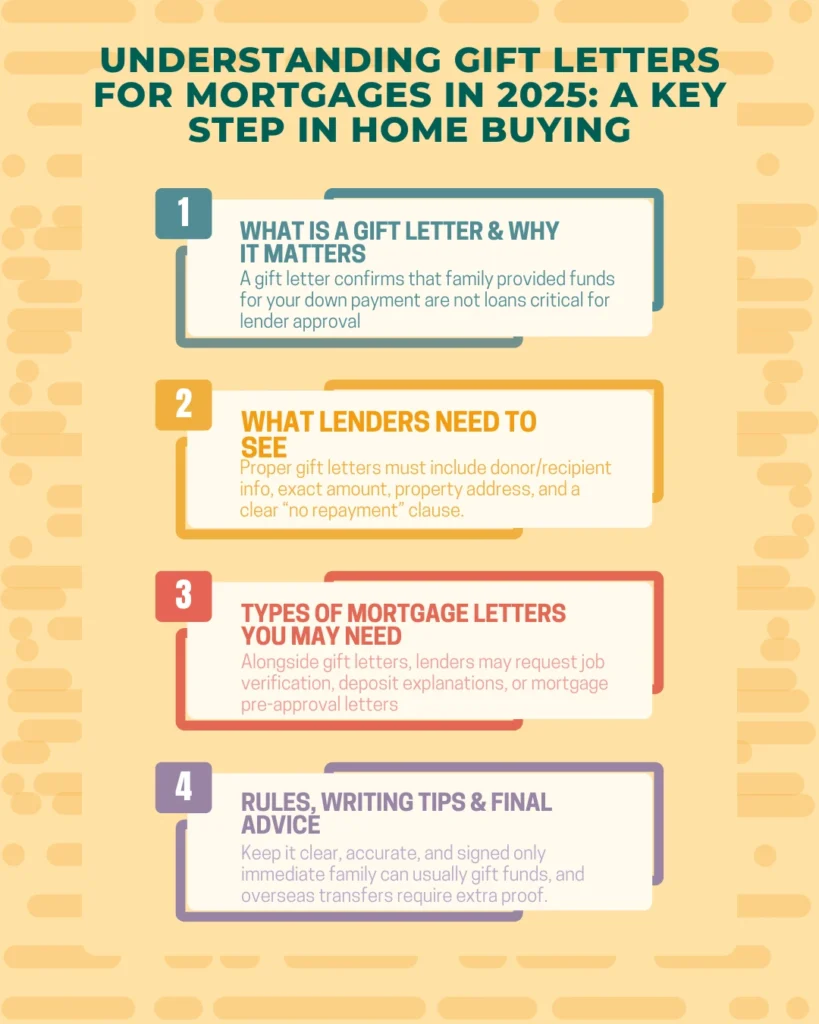Gift Letters for Mortgages: A Guide by Sale2Sold Mississauga



Buying a home is exciting, but it’s also one of the most significant financial commitments you’ll make. For many buyers, saving enough for a down payment is the most challenging part. That’s why financial help from family members has become so common. Parents, grandparents, or other close relatives often give money to help with the purchase. However, lenders won’t just take your word that this money is a gift. They require a document called a gift letter to confirm it. Understanding letters for mortgages what they are, why they’re needed, and how to prepare them can make the mortgage process much smoother.
Recent studies reveal that almost one third of first time buyers in Canada rely on gifted funds to secure their homes. With property prices still rising in 2025, more families are turning to this option. If you’re planning to use gifted money, knowing how to prepare these letters for Mortgages correctly is crucial.
Table of Contents
ToggleA gift letter is a formal document that explains to the lender where a portion of your down payment is coming from. Its primary purpose is to confirm that the funds you’re using are a gift, not a loan. Lenders need to be certain that you won’t have to repay this money, because additional debt could affect your ability to make mortgage payments.
Think of letters for mortgages as proof of honesty. They clearly state that the donor is giving you money with no expectation of repayment. Without this confirmation, the lender may delay or even reject your application. For homebuyers who rely on family assistance, having this document ready is non negotiable.
Lenders are careful about approving mortgages because they want to minimize risk. They use gift letters to ensure that every part of your financial situation is transparent and legitimate. When you receive a large sum of money, you need to verify it’s not a loan hiding in disguise.
There are three main reasons why lenders insist on this document:
By requiring letters for mortgages, they safeguard both you and themselves. It’s not just a formality it’s a critical part of the underwriting process.
Even though a gift letters for Mortgages is short, it has to include specific information to be accepted by the lender. A proper letter should have:
Here’s a simple example:
“I, [Donor’s Full Name], am giving [Recipient’s Full Name] the amount of [Dollar Amount] as a gift to assist with the purchase of [Property Address]. This money is a gift, not a loan, and repayment is neither expected nor implied. Signed: [Donor’s Signature], Date.”
When prepared correctly, letters for mortgages make it easy for lenders to approve the use of gifted funds.
While gift letters for Mortgages are common, they’re not the only type of letter you may need during the mortgage process. Different situations call for other documents:
Each of these plays a unique role in ensuring your application is complete. Including all necessary documents from the start reduces delays and helps you close faster.
Gift letters are most commonly used when family members help cover a down payment. But they can also apply to other situations, such as covering closing costs or additional fees during the purchase. They’re particularly common in expensive real estate markets, where saving the full amount is nearly impossible for many buyers.
For example, in areas where detached homes average over a million dollars, parents often step in to assist. In these cases, lenders require letters for mortgages to confirm the gift is legitimate. Without them, they may reject the gifted funds, leaving buyers scrambling to find alternatives.
Writing a gift letter isn’t complicated, but it must be done right. Follow these steps to make sure your letter meets lender expectations:
Please keep it simple. Avoid adding any extra conditions or unclear wording. Lenders prefer straightforward statements that leave no room for doubt.
Not every gift is acceptable. In Canada, most lenders only allow gifts from immediate family members, such as parents, siblings, or grandparents. They also require proof that the money came directly from the donor’s account. If the funds are transferred from overseas, additional verification may be needed.
In the United States, the rules can vary by loan type. FHA and VA loans have more flexible rules about who can provide a gift, while conventional loans often limit it to family. Regardless of the country, the key point remains the same: letters for mortgages must be accurate and supported by proper documentation.
Getting the paperwork right is essential when using gifted funds to buy a home. Properly prepared letters for mortgages ensure that lenders accept the money without hesitation. They clarify that the funds are a genuine gift, not a hidden loan, and that there are no strings attached.
When done correctly, these letters can speed up the approval process and remove unnecessary obstacles. If you’re planning to use a gift from family for your down payment, prepare the letter early and provide any supporting documents your lender requests. With the proper preparation, you’ll be one step closer to securing your dream home.